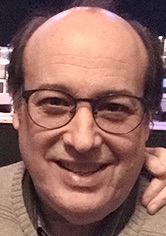It’s Always About Story
What path did you take to become a counselor?
I was a journalist for nearly 30 years, working for newspapers in California, Connecticut and North Carolina. As a lifelong writer and editor, I loved talking with people and understanding their stories or the stories they were part of. During my years as an editor, I grew to specialize in narrative writing and investigative work. When my journalism career ended, I initially went into communications and marketing, but I didn’t find that as fulfilling. I wanted to have more of a connection with people and social justice issues.
 My father was a key influence in my life. He was a recovering alcoholic who, after closing his longtime business, a dry-cleaning store, became manager at a halfway house. I saw how much he loved that work, and that memory (he died 37 years ago) also influenced my decision to pursue counseling.
My father was a key influence in my life. He was a recovering alcoholic who, after closing his longtime business, a dry-cleaning store, became manager at a halfway house. I saw how much he loved that work, and that memory (he died 37 years ago) also influenced my decision to pursue counseling.
How have you used your past in your work as a counselor?
Not surprisingly, I’ve been drawn to a postmodern theory of counseling called narrative therapy. This counseling orientation features the identification of what’s called a dominant narrative, the issue that has drawn a person to counseling. Once that issue is identified, counselor and client work to better understand everything about that narrative, using a variety of techniques.
One method I’ve adapted straight from my years as an editor is having clients think of a three-word narrative to describe why they came to counseling. We have a lot of discussion about that narrative, identify past narratives in their lives and develop a preferred narrative. We identify their personal strengths and support networks, as well as obstacles. Slowly, using narrative and other techniques (e.g., cognitive behavioral therapy, mindfulness), we work on means for the client to move toward their preferred narrative and away from the dominant narrative that brought them to counseling.
What do you enjoy most about counseling?
I’ve found that one of the most dominant, often unstated issues behind peoples’ struggle is loneliness. By providing a warm, non-judgmental environment, I’m doing what I can to help provide my clients a safe space for an hour a week. That grows my spirituality, and I’m humbled and grateful that my clients give me this opportunity.
Les Gura works for CareNet’s Piedmont Triad regional center out of the Winston-Salem office. He can be reached at [email protected].

